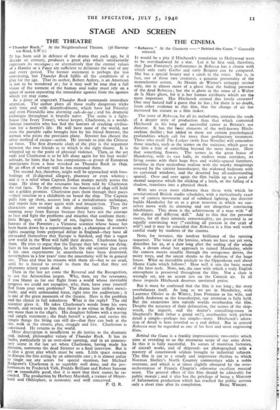STAGE AND SCREEN
THE THEATRE
Thunder Rock." At the Neighbourhood Theatre. (38 Harring- ton Road, S.W.7.) - IT has been said in defence of the drama that each age, be it decade or century, produces a great play which satisfactorily eicpresses its mystique ; or alternatively that the eternal values of a Hamlet or a Faust are sufficient to delineate the soul of any and every period. The former statement is perhaps lie less convincing, but Thunder Rock fulfils all the conditions of a play for the age. That its author, Robert Ardrey, is an American is not to be wondered at ; for it may well be true that a full vision of the torment of the human soul today must rely on a space of ocean separating the immediate agonies from the agonies which yet may come.
As a piece of stagecraft Thunder Rock commands immediate attention. The author plays all those really dangerous tricks with time and with disembodiment, which have led Priestley and even Pirandello into alarming culs-de-sac ; and his dramatic technique throughout is brutally naïve. The scene is a light- house (the Ivory Tower), whose keeper, Charleston, is a world- famous journalist who has fled the horrors of cracking civilisa- tion for a hermit's life. He will have none of the world, not even the portable radio brought him by his friend Streeter, the airman who pilots the provision plane. Streeter has chosen the other method of escape—action. He intends to join the Chinese air force. The first dramatic clash of the play is the argument between the two friends as to which is the right theory. It is whipped up to the point of physical violence. Then, as the act ends and Charleston is to be left alone again for his four weeks' solitude, he hints that he has companions—a group of European immigrants from a boat wrecked on Thunder Rock in 1849. By an effort of solitary will he has recreated them.
The second Act, therefore, might well be approached with fore- bodings of ill-digested allegory, phantasy or even whimsy ; and it is a relief when Captain Joshua stumps noisily across the stage. He alone of the revenants has been told by Charleston the real facts. To the others the vast Americas of 1849 still hold out a golden promise. Charleston puts them through their paces —their reaction to a childbirth on board the ship. The Captain pulls him up short, accuses him of a melodramatic technique, and impels him to start again with real imaginnion. Then the characters are revealed in their absolute reality. They are running away from Europe because they have not the courage to face and fight the problems and miseries that confront them: little Briggs with a family of ten, fugitive from the smoky horrors of the Potteries ; a Viennese scientist whose house has been burnt down by a superstitious mob ; a champion of women's rights escaping from perpetual defeat in England—they have all persuaded themselves that Europe is finished, and that a vague new world in the West will fulfil their desires. Charleston faces them. He tries to argue that the Europe they left was not dying. Sure in his actual knowledge, he tells the old scientist that even if his own experiments in anaesthesia have been destroyed, nevertheless in a few years' time the anaesthetic will be in general use. Thus and thus he reasons with them all—but to no avail, until he is forced to reveal to them the fact that they are phantoms ninety years dead.
Then in the last act come the Reversal and the Recognition, to use the Aristotelian jargon. Why, then say the revenants, if you blame us for our flight from a world whose inevitable progress we could not recognise, why, then, have your yourself fled from your own problems? The drama here strikes merci- lessly, and with unbounded force, right into the auditorium ; it is one of the great moments of the theatre. Here is the problem and the choice in full nakedness. What is the reply? The old scientist gives it. He takes Charleston's words from his own mouth, and reveals to him that there is no virtue in flight today any more than in the 1840's. His daughter follows with a moving and simple statement ; she finds herself a ghost, and envies the simple things the living can still do—that they can look at the sky, walk in the streets, plan, struggle and live. Charleston is convinced. He returns to the world.
Mere description is insufficient to do justice to the dramatic and, indeed, philosophic values of Thunder Rock. It has its faults, particularly in an over-slow opening, and in an unneces- sary scene in the last act when Charleston having made his decision, summons the dead Streeter to a final interview. But it is also a great play which must be seen. Little space remains to discuss the fine acting by an admirable cast ; it is almost unfair to single out any actors for special mention, but Michael Redgrave's Charleston is so superbly well done, and the per- formances by Frederick Valk, Fredda Brilliant and Robert Sansom are se remarkably good, that it is meet that their names be re- corded. The production by Herbert Marshall, a trainee of Meyer- hold and Okhlopkov, is economic and well conceived.
P. Q. R.






























 Previous page
Previous page